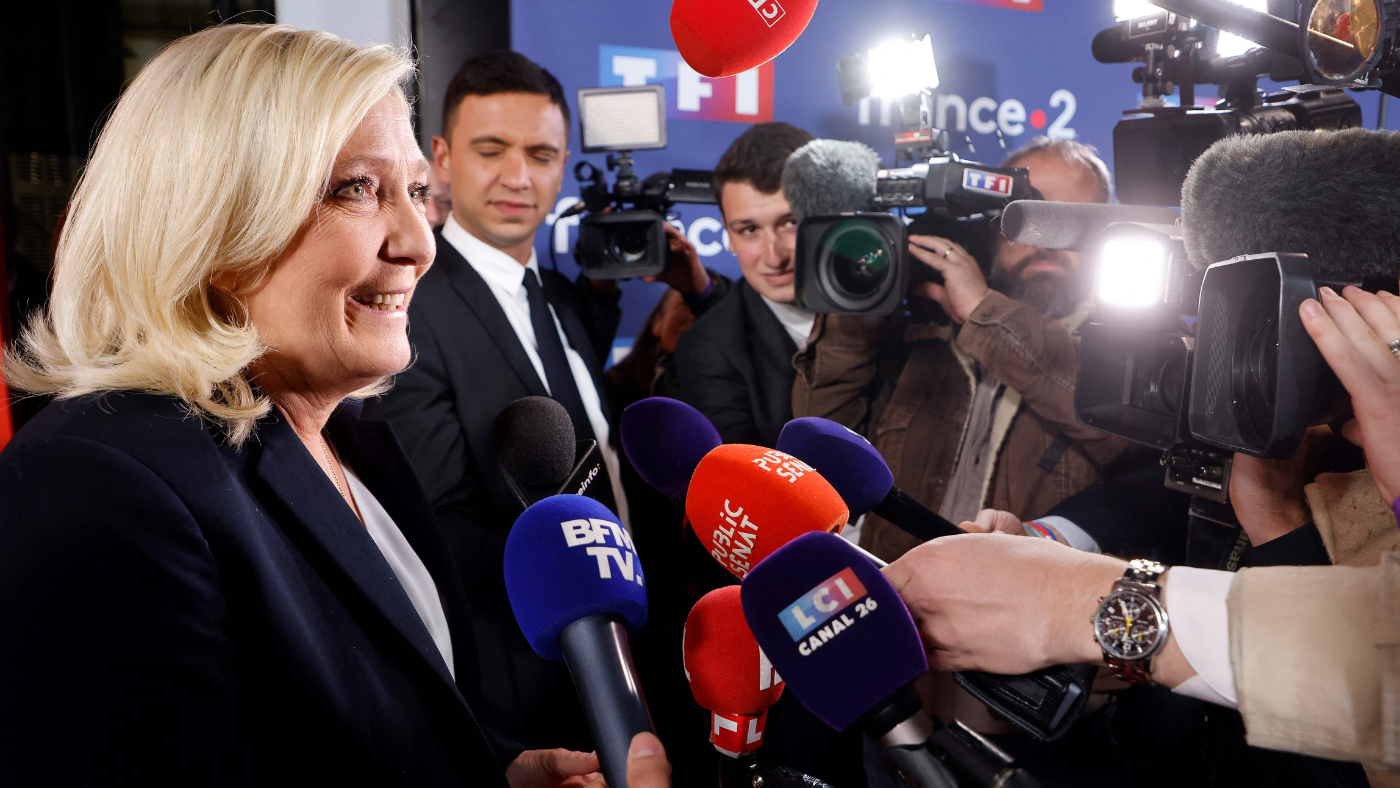Is France’s far-right a threat to the European Union?
Recent election results ‘cemented’ status of Marine Le Pen’s Eurosceptic party as ‘mainstream’ opposition

A free daily email with the biggest news stories of the day – and the best features from TheWeek.com
You are now subscribed
Your newsletter sign-up was successful
EU leaders rushed to congratulate Emmanuel Macron after he beat far-right leader Marine Le Pen to secure a second term in office in France’s presidential elections in April.
The Europe-wide support for Macron reflected “relief that one of the bloc’s pivotal countries had avoided a political shock”, said Reuters. Le Pen’s “potentially explosive social and economic reforms” had triggered alarm, with analysts and diplomats warning of “huge implications for the stability of the EU” if the “deeply eurosceptic” far-right leader became president.
But while Macron held on to the top job, his centrist Ensemble coalition “suffered a massive political defeat” in legislative elections earlier this month, said the i news site’s Leo Cendrowicz. A “surge in support for hard left and extreme right” left Macron “well short of the absolute majority needed to control parliament”.
The Week
Escape your echo chamber. Get the facts behind the news, plus analysis from multiple perspectives.

Sign up for The Week's Free Newsletters
From our morning news briefing to a weekly Good News Newsletter, get the best of The Week delivered directly to your inbox.
From our morning news briefing to a weekly Good News Newsletter, get the best of The Week delivered directly to your inbox.
Le Pen’s National Rally “scored a historic success” by increasing its number of deputies in the National Assembly's lower house from eight to 89, “cementing the party’s rise from fringe status to mainstream opposition”, said Reuters’ Paris-based correspondent John Irish. The result sent “shockwaves” through France – and could have significant implications across the EU too.
France, the EU and the far-right
France was a founding member of the EU, and with the second-largest economy in the bloc, “French leadership matters hugely to the future of the European project”, said Susi Dennison and Tara Varma of the European Council on Foreign Relations.
France is “half of the vital Franco-German engine” that has “powered” the EU “since its creation”, said The Guardian. In fact, Macron is arguably “succeeding” Germany’s former chancellor Angela Merkel “as the European Union’s de-facto leader”, said Voa News.
Le Pen, by contrast,has “flirted with the idea” of leaving the EU since being elected to take over from her father, Jean-Marie Le Pen, as National Rally’s leader in 2011, said Reuters.
A free daily email with the biggest news stories of the day – and the best features from TheWeek.com
During her second presidential bid, in 2017, she campaigned for “Frexit”, but was hobbled by voters’ “fear of the economic consequences of that policy”, said The Guardian.
Le Pen subsequently softened her anti-EU stance, telling voters on the campaign trail this year that Frexit was no longer her “objective”. Yet many of her plans for the French economy, social policy and immigration implied “breaking the EU’s rules”, the paper added.
Mutjaba Rahman, a former economist at the UK Treasury and European Commission, tweeted ahead of the April election that Le Pen was essentially offering “a policy of Frexit which does not speak its name”.
Still a risk?
Despite the “sighs of relief” following Macron’s recent presidency victory, “more than half of French voters supported candidates in the first round of the election who are critical of the EU”, said Reuters.
So should the bloc be worried by the rise in support for the National Rally? Could the election results bolster nationalist parties across the EU? And what are the chances of a future Frexit?
In this episode of The Overview, The Week shares insights from guest experts Dr Andrew Smith, reader in contemporary history and politics at the University of Chichester, Georgina Wright, senior fellow and director of the Institut Montaigne think-tank’s Europe programme, and Ivan Krastev, political scientist at the Institute for Human Sciences in Vienna.
Julia O'Driscoll is the engagement editor. She covers UK and world news, as well as writing lifestyle and travel features. She regularly appears on “The Week Unwrapped” podcast, and hosted The Week's short-form documentary podcast, “The Overview”. Julia was previously the content and social media editor at sustainability consultancy Eco-Age, where she interviewed prominent voices in sustainable fashion and climate movements. She has a master's in liberal arts from Bristol University, and spent a year studying at Charles University in Prague.